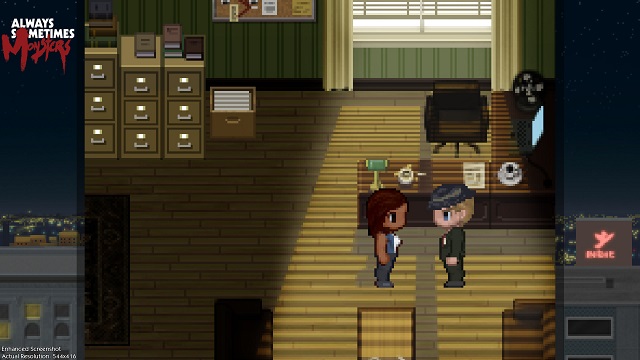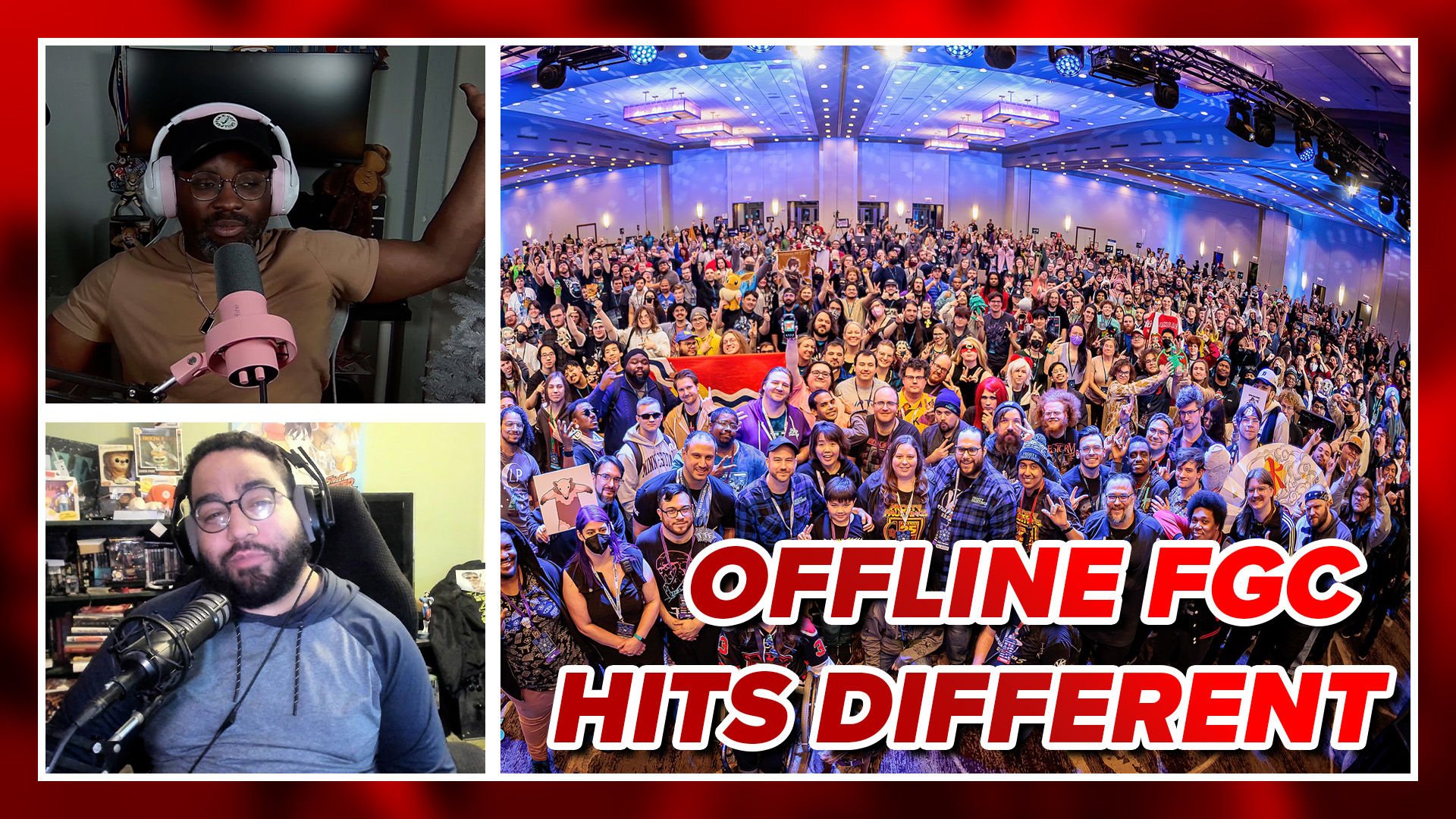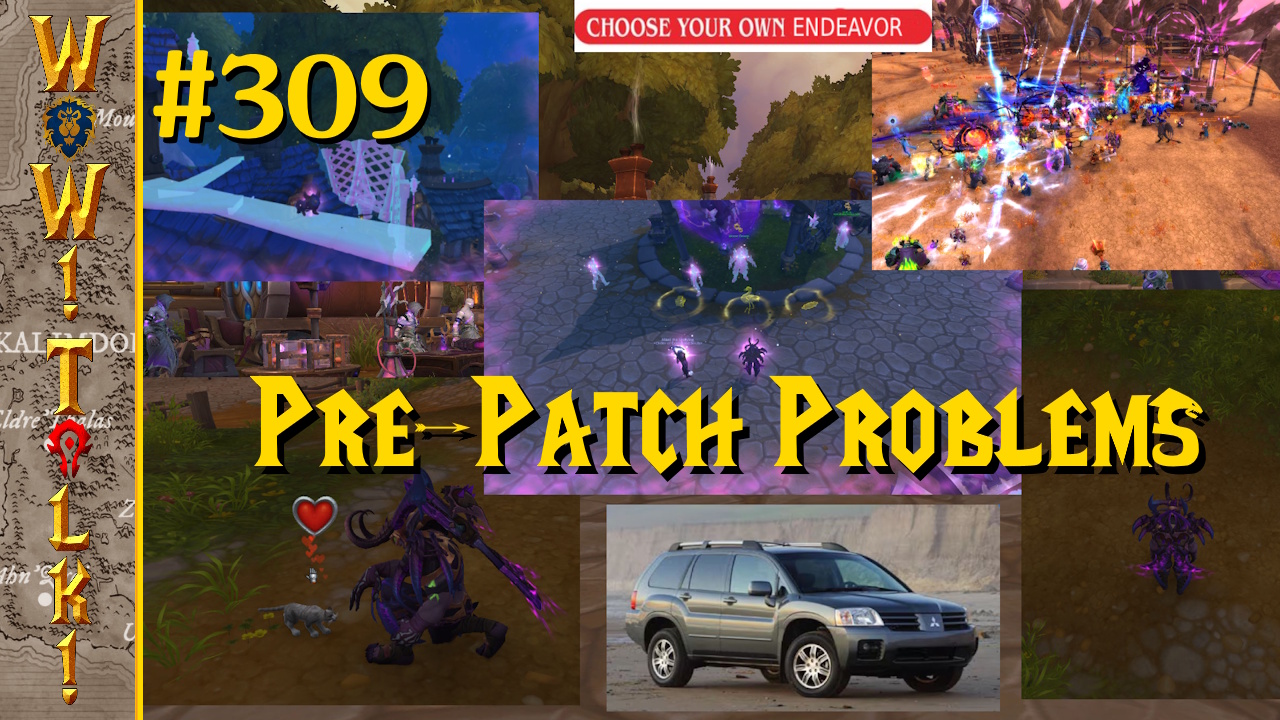Have you ever sat back and thought about the decisions and life events that have lead you to where you are in life? How chance meetings and quick calls have all lead up to this moment? How often has a single decision made the difference in your life? I can trace most of my friends and career to a single decision I made about five years ago, and even my work here at Mash Those Buttons can be traced back to deciding to sit with a friend and wait for a panel at PAX East 2012 that I didn’t even want to go to. You really never know when you’re making a call that will change your life forever, and that premise is what drives every moment of the game Always Sometimes Monsters.
The game is touted as an RPG without combat, which does a good job of describing it. The only thing you can do in this game is talk to people. If you get into a fight or disagreement, your only weapons are your words. I’m not talking some pseudo-combat system where you use words to fight back, but literally talking your way out of bad situations. This is a game about how what you say and do affects your life and the people you touch upon – so if you aren’t interested in storyline alone, this game may not be for you.
Even so, I think everyone should check this game out just for the way it handles its storyline. I’ve heard of a lot of games saying that they change based on how the player interacts with them. At most, many of these systems just tend to lead toward obvious good/evil endings, or they allow for a couple of choices to change the way the game goes. Even Telltale Games’ Walking Dead and The Wolf Among Us, while offering many dialogue options, are often only affected by about a handful of things you say and do. While you can affect some events, those games are still largely on rails. Always Sometimes Monsters felt like the first game I’ve ever played to truly embrace my decisions and make each one important.
This became clear right from the start. The simple matter of who I talked to at the beginning of the game, as well as some decisions I thought I needed to make just to get the ball rolling, chose which character I played with. I didn’t even think I was doing anything important rather than talking to NPCs, but I was accidentally picking character traits. I was floored when I found out, as the game had read what I was doing and handed me my character without my knowledge, asking me if I was okay with my choices. I hadn’t even known I was making important choices yet, and it is hard to get over that instinct while you play, to be honest.
How many players are agreeable just to get things moving while playing a game? How many times have you agreed to do something because the game has just asked you to do it? I’ve done it, knowing that games have often asked ‘yes or no’ simply as a formality. If you’ve ever played Rambo on the NES, you may remember a moment when the game tells you that it won’t start until you agree to something right at the beginning – constantly repeating the question until you agree. For the most part, games haven’t shifted all that much from that thought pattern, so I found myself trained to just agree when asked to do something. It’s a hard reflex to break, but it’s one that will have you hurting relationships and breaking promises in a hurry if you don’t get it under control.
Within minutes of starting the game, I’d agreed to clean an old woman’s apartment, help a friend lug stuff around for his performance, and get drugs for some woman I’d just met while delivering a sealed envelope. I’d done it because that’s what I was used to doing in games, and all of a sudden it dawned on me that I might be making some bad calls. What if the drug dealer was a cop? What if the friend, who my character had already mentioned was in bad shape, got me into a really bad scene? What if I didn’t make much money from helping the old lady and wasted my day? All of a sudden, I was thinking about what I was saying in a game, and my mindset began to switch over to the right one to play this game. Always Sometimes Monsters actually wants you to think about what you say and really wonder about the consequences before you say it. Not just once, but every single time you make a call, and seamlessly broke me of a bad habit I’ve played games with for years.
You start off the game with an invite to your ex-girlfriend’s wedding that’s a month away, but you’re also five hundred dollars behind on your rent. Whether you manage to get to that wedding or pay off that debt relies entirely on what you choose to do next, if you even choose to strive toward either of those things at all. The entire game is about doing whatever it is you want to do, and then dealing with what happens next, creating an experience you can treat as your own moral playground, or as a way of seeing aspects about what kind of person you are.
I tend to play a nice guy. I have a hard time playing the bad guy or making awful decisions, but it didn’t take very long before my desire to help everyone who asks had already gotten me into trouble. That nice girl who asked me to pick up drugs for her? Well, how could I refuse some random person standing in line for a concert? And when she told me to come by after the show? Well, why not? I didn’t have a place to live any more since I handed the landlord my apartment key. Do you think this line of thinking went well for me? That everything was all right?
What was most amazing to me was how organic it all felt. All I’d done was talk to an NPC, and all of a sudden my game was going in a whole new direction. I know that sometimes games have side conversations that end up being important, but in Always Sometimes Monsters, everything does. The NPCs aren’t there to tell you where the mountains are or which compass direction the thieves have run off in; they exist to guide your game. All of the characters in the game have or will have some importance at a point, just as any conversation can take your real world life in a whole new direction.
The mechanics of just how this worked were enough to amaze me. The developers put a ton of work into making sure that so many different characters and options would all come together, letting you guide the game with whatever person you happen to talk to. Random conversations would lead me all over the city and develop the game in ways I just couldn’t expect. No matter who I decided to talk to, the game seemed prepared to send me in a new direction, one with branching plots and occurrences. I can’t even imagine how much work had to go into connecting so many different possible story branches, and just seeing it all come together no matter what I did was amazing. That the story can go in so many different ways and still tell an interesting tale is something else that’s well worth your time.
It’s a touching, heart-wrenching tale depending on how you choose to tell it, too. As I said, this is your own morality tale, one that doesn’t judge what you do. Your acts are neither good nor evil, although some of them will make you smile while others might make you sick to your stomach. There are some real low points you can reach in this game – things you do to make a few bucks when you’re at your worst point. If you want your character to survive, though, or if you’re willing to do anything to get the money you need, some really dark events can happen. At those points, there’s no morality scale beyond what exists in yourself, but when your character’s survival is in the balance, what do you do? Is your character’s life and wants the most important thing, or do you hold to your convictions? No one will judge you either way, but you and your character will have to live with the results.
Consequences are what Always Sometimes Monsters is about. You can go anywhere and do anything, just as in your real life, but you always have to deal with the consequences of what you’ve done. You have to live with the guilt and deal with what happens when you make a bad call or hurt a friend, for while the game will let you reach its conclusion however you like, you will be left to reflect on how you got there. It’s a great game to make you think about yourself, how you play games, and what you would do in some of these situations. I literally had to walk away a few times due to how dark some of these decisions were, feeling sick at the very idea that my character had reached this point.
I walked many paths in Always Sometimes Monsters, and many I’m not proud of. This is one of those games where the story is truly different every time you play it, branching in many directions. How you deal with the character’s problems is up to you, and while there’s no combat to wow players, the constant battle against the easy way out and against your own moral compass is far more interesting to me than whacking slimes and goblins. It’s a unique style of game, one that story lovers will definitely enjoy more, but if you’re willing to really take a close look at yourself, it’s worth buying. It’s a stunning example of the power of video games to make people think about and examine their lives.
Always Sometimes Monsters is available for $9.99 on Steam.


![Always Sometimes Monsters [Review]](http://cdn.mashthosebuttons.com/wp-content/uploads/2014/06/ss_aebafe3b1dd6c127dfb8801a08e04953b51e6ff3.1920x10801.jpg)
![Always Sometimes Monsters [Review]](http://cdn.mashthosebuttons.com/wp-content/uploads/2014/06/ss_3b48f0513d404594791434f34d48e534f73575ee.1920x1080.jpg)
![Always Sometimes Monsters [Review]](http://cdn.mashthosebuttons.com/wp-content/uploads/2014/06/ss_d6bb834a791fbf9896225fccf765b9a2e11e8350.1920x1080.jpg)



